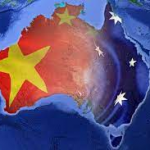 It has been 50 years since Australia first established diplomatic relations with China. But compared to the relative enthusiasm of the early years, modern relations between the two nations are in a deep freeze. Certainly, Australia’s call for an international investigation into the origins of the coronavirus outbreak has not helped the situation. In fact, it has led China to impose sanctions on Australian exports such as coal coke and iron ore.
It has been 50 years since Australia first established diplomatic relations with China. But compared to the relative enthusiasm of the early years, modern relations between the two nations are in a deep freeze. Certainly, Australia’s call for an international investigation into the origins of the coronavirus outbreak has not helped the situation. In fact, it has led China to impose sanctions on Australian exports such as coal coke and iron ore.
However, in recent days, things have begun to change. For starters, China’s foreign minister, Wang Yi, admitted to a visiting Australian delegation that China-Australia relations have encountered difficulties and setbacks. He also told the council, led by Foreign Minister Penny Wong, that this represents an opportunity to learn some valuable lessons. Indeed, the occasion marked the 50th anniversary of bilateral relations between the two nations. With so much positivity emerging from the meeting, many trade experts began to speculate on a potential thaw in relations.
Wang informed his Australian counterpart that their countries have “no fundamental conflicts of interest.” He also suggested using the 50th anniversary to reorganize and restart. Experts now hope this will kick off a new era of trade, boosting iron ore and other mining sectors as well as new energy industries.
Before the sanctions, Australian trade with China was worth $280 billion. Most of the transactions consisted of iron ore, coke and liquefied natural gas (LNG). In fact, more than 60 percent of China’s iron ore requirements were of Australian origin. Even in 2021, when reports were at an all-time high, Chinese customs data showed that the country had imported 694 million tons of iron ore from Australia. Ultimately, this figure accounted for about 62 percent of total imports.
As relations soured, both countries sought to find other markets for their imports and exports. Australia, for example, began to look to India and Japan to fill the gap left by declining trade with China. In fact, between April and October this year, Indian imports of Australian goods, including coal, aluminum and copper, rose to $12.3 billion. This represents a 48 percent increase from a year ago. India was also Australia’s second largest market for coal exports in 2020-21.
Today, COVID-affected China finds itself increasingly isolated, not only from the United States but also from most of the world. As a result, its policymakers have prudently decided to return to one of their oldest allies-Australia. The hope is that the country can regain supplies of vital items such as iron ore and carbon coke.
In anticipation of the removal of Chinese trade sanctions, Chinese carbon coke futures fell. In fact, traders believed that the supply of raw materials for steel production would soon increase. The Chinese also believe that a full resumption of trade would mean the release of Australian coal, which would turn China’s current shortage into a surplus.
Although China has taken the first step toward normalizing trade between the two countries, much still depends on Australia. This is especially true in light of the latter’s growing strategic relationship with the United States and other neighboring countries. For example, the fact that 21 of the 49 minerals listed in India’s critical minerals strategy are located in Australia makes it an ideal export partner.
.gif) Loading
Loading

